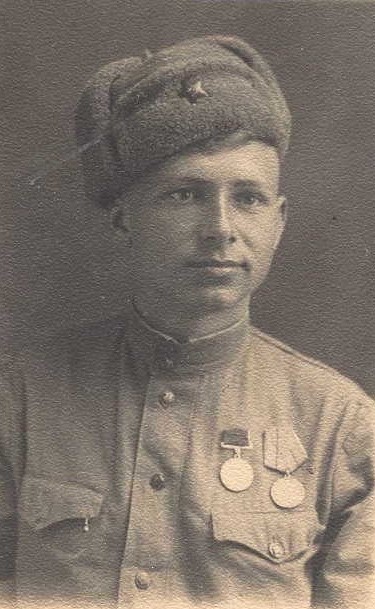Naum Tiagunskii was born in 1921 in the shtetl of Lipovets, east of Vinnitsa, in Ukraine. His father was a shop assistant. In the early 1930s the family moved to Odessa, where Naum graduated from a Ukrainian-language school. He recollects that at first it was difficult for him because, as the native of a shtetl, he spoke Yiddish and had only a basic knowledge of Ukrainian and Russian. The Ukrainian school attended by Naum was multi-ethnic, with many Jewish pupils there. He recalled that there were five boys named Israel in his class – all of whom were drafted into the Red Army in 1941 and none of whom returned from the war.[1] In 1939 Tiagunskii in 1939 entered the Odessa Electro-Technical Institute of Communications (now the O.S. Popov Odessa National Academy of Telecommunications) to study a new promising branch of technics – television.
In July 1941, after the German attack on the Soviet Union, second year student Tiagunskii was drafted into the Red Army. Naum bade his family goodbye, unaware that he would never see his parents or his 16-year-old sister again. They were shot to death by the Romanian occupiers in the winter of 1941-1942. Meanwhile, the young men from Odessa who had recently been drafted were sent to Dnepropetrovsk (now Dnipro, in Eastern Ukraine). There the military authorities realized that it made sense to train these semi-educated young men as junior officers. The training course lasted two months, after which the cadets were given weapons and sent to defend Dnepropetrovsk, which the Germans were approaching in September 1941. There Tiagunskii had his baptism by fire, that included German tank attacks, being targeted by carpet bombing, and the death of comrades. Shortly afterwards, the remaining personnel of his unit fled. Naum and his surviving comrades crossed the Dnieper River to the eastern, Soviet-held side. Fortunately, the security units of the division that accepted them did not investigate the circumstances of their flight. After some rest, Naum and the others were assigned to various regiments and divisions. His new commander decided that it made no sense to make Naum Tiagunskii an officer because he was too young and had little combat experience, and he was assigned as a private to an infantry regiment. Soon thereafter he was shell shocked. After a short stay in hospital, he was reassigned to the 62nd Army that later played an important role in defending Stalingrad.
In the 62nd Army, Tiagunskii became a supply officer for military equipment. This position meant that he had to deliver to the front lines, often under enemy fire, ammunition and equipment, using a tractor and several trailers. After one safe delivery under heavy enemy shelling in August 1942, he was awarded his first "For Courage" medal. Some time later he was seriously wounded in the leg and sent to a hospital situated in the rear near Stalingrad. During the several months that Naum was in the hospital the enemy approached Stalingrad. When the fighting had already begun in the city, Private Tiagunskii was released from the hospital to take part in the Battle of Stalingrad.
At some point Tiagunskii was promoted to the rank of lieutenant. When fighting in Poland in 1944, he served as the assistant commander of a platoon. His platoon was among the first Soviet units to enter the death camp of Majdanek (near Lublin) in July 1944. (The SS guards had abandoned the camp a short time before). Tiagunskii already knew that his family had been killed in Odessa, but the view of the Nazi mass murder machinery filled him with even greater hatred toward the German murderers.
In April 1945, during the fighting for Berlin, Tiagunskii was seriously wounded and subsequently released from the army as an invalid.
Tiagunskii encountered antisemitism more than once in his life, but less in the army than in the postwar Soviet Union. After the war he graduated from the Polytechnic Institute in Odessa and then worked at a large factory. In 1990, he emigrated from the USSR and settled in Israel. As he wrote in his unfinished memoir, he took the decision to leave the Soviet Union not only due to the murder of his family in Romanian-occupied Odessa, but also because of the all the injustice he had seen in the Soviet life.
[1] "Epizody iz zhizni malenkogo cheloveka, prozhivshego bolshuiu zhizn" (Episodes from the Life of a Little Man Who Lived a Long Life, unfinished memoir)







